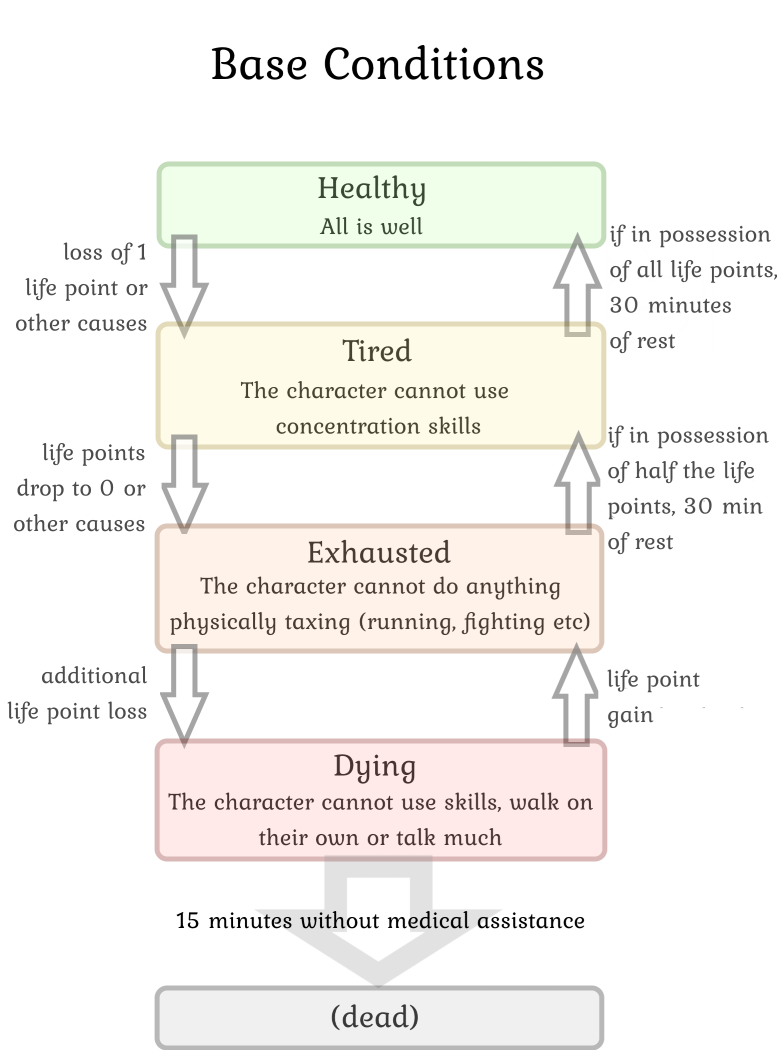Rules
Warning: this is a rules summary. Reading the summary does not replace a healthy rules diet. In case of confusion or unanswered questions, consult the full rules or a Game Master.
Table of Contents
What rules should I read?
- general rules
- character rules (at least once upon character creation; it is recommended to reread it in order to remember your race’s cool abilities)
- class rules for your own class
Everything else is voluntary.
Links to Full Rules
1. General Rules
2. Character Rules
Classes
3. Alchemist
4. Expert
5. Rogue
6. Mage
7. Priest
8. Sorcerer
9. Warrior
IG and OG
The game begins and ends with a Game Master´s proclamation. The game may be stopped in case of a dangerous situation (see the Gamestop rule). Out-of-Game objects and locations are marked with a red and white ribbon and must be ignored. The players may go Out-of-Game by holding their fist on top of the head. Going Out-of-Game to avoid In-Game consequences is strongly discouraged.
Players who keep going Out-of-Game and bothering other players will receive a warning from the GM. After a third warning the player will be removed from the game and must leave the event.
Safety
The game can be stopped in case of OG danger by using the Gamestop rule. Hearing the call “gamestop”, all players must immediately stop playing and remain, silently, where they are until the situation is resolved and the GM allows the game to continue.
If an IG situation becomes uncomfortable, a player may stop it by saying “safe word” (“turvasõna” in Estonian). Others are then obliged to stop role playing. The person who used the safe word explains what they need to continue the game (concluding or changing the situation, leaving with no questions asked or something else). The use of the safe word does not need justification.
Fighting:
-
It is forbidden to injure another player on purpose, to fight in an overly brutal manner and to aim hits towards the groin and the head.
-
Physical contact is not allowed (such as grabbing hold of an enemy, throwing or pushing them etc). Wrestling is allowed only away from combat and in case of mutual agreement. Pushing with shields is forbidden.
-
All foam weapons must pass the security check before game start. The security check follows the regulations of Nordic Equinox (check http://www.ancalagon.ee/index.php/en/essentials/game-rules Addendum 1). We are especially careful with bows and arrows. Using unchecked weapons for fighting is not allowed!
Possible dangerous locations are marked with white and red balls after dark. This has no IG meaning. The OG meaning is to compel caution in the vicinity of the lights. If this method is used, it will be explained in detail during the opening brief.
Tying up another character is denoted with string that the character holds around their hands. There is no Out-of-Game binding.
Consuming a drink in-game does not necessitate drinking it out-of-game, players may pour the liquid on the ground.
Languages
If foreign players are participating, all battle effects must be declared in English. If foreign players are not present, the game uses Estonian. All effects are included in the rules.
Markings
Stickers


Some locations or objects on the game grounds may be marked with a sticker. There are two kinds of stickers:
- Exclamation mark: GM necessary to interact with location/object.
- Question mark: written instructions included, GM not necessary.
Light Orbs
Glowing orbs mean magical effects (except a combination of red and white lights, as mentioned above).
Character Health
A character has a certain amount of life points that cannot fall below zero. A character is always in some condition (specified below). If a character loses life points, their condition changes. If a character is healed (such as with the Medicine skill), life points start to recover.
A character can be killed while in the Dying condition. The kill must be roleplayed.
Battle
All fighting must respect the safety instructions.
If a character does not have any weapon use skills, they cannot start the game with any weapons except knives. They can only use a one-handed weapon in combat and gain the tired condition after every battle (even if they were never hit and didn’t hit others).
Fighting characters can use strikes or thrusts. Glancing blows do not count. For a hit to register, it has to fulfill one of two conditions:
- The hit was preceded by a swing of at least 1 m.
- The target felt or heard the hit.
Unless otherwise specified, each hit deals one damage. To deal extra damage, the attacker must audibly declare it during their strike.
Players must react to wounds accordingly, as well as use of Medicine. A wounded character may be healed by another character or themselves, as long as the healer has the necessary skill.
Armor
If the character has armor points, they are lost before life points (the exception is ranged weapons, which ignore non-magical armor points and reduce life points straight away without touching armor). The number of armor points of each character is determined by the GM before game start. If armor points fall to zero, the armor is broken and must be repaired with the Blacksmith skill. If the armor has at least some armor points remaining at the end of combat, it has full armor points when combat begins again.
Hand-to-Hand Fighting
Hand-to-hand fights can happen between two characters. The characters play rock-paper-scissors to determine the winner and then roleplay the fight. The loser gains the stunned condition. A challenge to fight hand-to-hand can be denied by drawing a weapon and it ends when a third character intervenes.
Conditions
Base Conditions
There are four base conditions: Healthy, Tired, Exhausted and Dying.
Healthy
All is well. The character is unharmed and can use all their skills.
Tired
Effect: the character cannot use concentration skills (marked with “€”).
Caused by: loss of life points. There may be other causes (such as magical effects).
Removed by: 30 minutes of rest, after which the character becomes healthy. Regaining life points does not end the tired condition.
Exhausted
Effect: the character cannot use concentration skills (€), cannot fight, run or perform any other physicall taxing activity. They feel bad.
Caused by: life points dropping to 0. There may be other causes.
Removed by: using the Medicine skill or alchemical and magical healing; the condition does not pass on its own (except with the Regeneration trait). Regaining life points does not end the exhausted condition.
Dying
Effect: The character is in critical condition. They cannot fight or use skills. They must lie down and may only move by crawling very slowly. They may talk slowly, using only a few words.
Caused by: an exhausted character getting hit with a weapon or affected by other life point loss.
Removed by: using the Medicine skill or magical healing. NB! If the character does not receive medical assistance within 15 minutes, they will die.

Other Conditions
Unconscious – The character is unconscious for 2 minutes. They close their eyes and ignore anything seen or heard. The player counts slowly to 120 and then the condition ends.
Losing life points also ends this condition.
Stunned – The character cannot speak or move for 3 seconds.
Pinned – The character is thoroughly tied up or bound by magic. They cannot move their limbs. Duration depends on the source of the effect. The condition is marked by a piece of string held on the wrists, There is no Out-of-Game binding. The Pinned condition is removed by a skilful escape, release by someone else or ending the binding spell.
Frightened - The character flees the frightening effect at first chance. If running is not possible, they will try to defend themselvers or hide.
Variable Effect Conditions
Poisoned – The character is poisoned. Poisons have different effects (losing life points, changing the base condition etc). The poisoned condition is ended by an antidote or a healing spell.
Sick – The character is sick. Illnesses have different effects (changing the base condition, inablity to perform certain actions). The sick condition is ended by healing.
Magic
Only certain classes can use magic (mage, priest, sorcerer). All of them must perform certain actions (movement or words), then announce the name and effect of the spell.
Some spells are denoted with light orbs that represent a visible magical aura around an object or person. Light orbs cannot be stolen. If a player receives a light orb from someone, they must return it after the magical effect ends. All characters see the aura; magic wielders can ask the GM for the source of the spell, but additional information requires the correct spell or ability.
Spellcasting requires Out-of-Game logical thinking: the spell’s target must know what is happening to them (the caster has to speak loudly enough and make a far away target notice them etc). Once the caster has pronounced the spell’s Out-of-Game name, it enters into effect.
All players don’t have to know all spells, their names and effects. Everyone should read at least the information in the General Rules document, but in general it is the caster’s responsibility to know what they are doing, how it affects others and how to communicate it as quickly and unambiguously as possible.